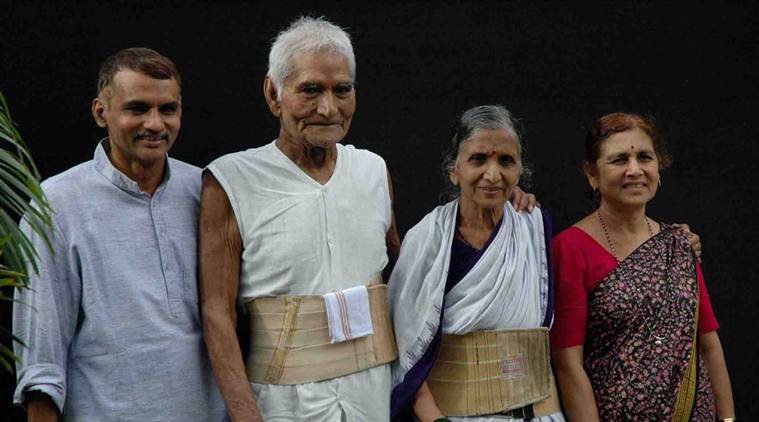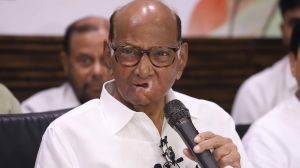Stay updated with the latest - Click here to follow us on Instagram
On his birth anniversary, remembering social reformer Baba Amte
To fight the stigma associated with leprosy, Baba Amte once injected himself with bacilli from a patient, to prove the ailment was not highly contagious.
 Baba Amte with his wife Sadhanatai, son Dr Prakash Amte and daughter-in-law Mandakini. (Express archive photo by Shekhar Soni)
Baba Amte with his wife Sadhanatai, son Dr Prakash Amte and daughter-in-law Mandakini. (Express archive photo by Shekhar Soni)
Today (December 26, 2019) is the 105th birth anniversary of Baba Amte, the social reformer and activist who devoted his life to serving leprosy patients and removing the stigma around the ailment.
Winner of the Padma Vibhushan (1986) and the Ramon Magsaysay Award (1985), Baba Amte in 1949 established Anandwan, a leprosy care centre, in Chandrapur district of Maharashtra, where patients were offered care and a self-reliant way of life.
The great social reformer #BabaAmte dedicated his entire life to serving humanity & he moved forward with the motto “Work Builds; Charity Destroys”. Baba formed #Anandwan (Forest of Joy), to serve the people suffering from leprosy.
Tributes on his birth anniversary. pic.twitter.com/64GZCBWFTm
— MAHA INFO CENTRE (@micnewdelhi) December 26, 2019
Baba Amte was born Murlidhar Devidas Amte, on December 26, 1914, in Hinganghat, Wardha. Called Baba by his parents, Amte was born in luxury — his father was a landowner and British government official. He trained as a lawyer and for a while, enjoyed the life of a rich young man, horse-riding, hunting, playing bridge and tennis.
However, he was soon involved in the freedom struggle, and began working with Mahatma Gandhi. The website of Anandwan describes how an encounter with a leprosy patient changed Baba Amte’s life — the sight of Tulshiram filled him with fear.
“I had never been frightened of anything. Because I fought British tommies to save the honour of an Indian lady, Gandhiji called me ‘Abhay Sadhak’, fearless seeker of the truth. When the sweepers of Warora challenged me to clean the gutters, I did so; but the same person quivered in fright when he saw the living corpse of Tulshiram.”
Baba Amte was convinced that leprosy patients could be truly helped only when the society found a cure for what he called ‘Mental Leprosy’ — the stigma and fear associated with the disease.
Thus was founded Maharogi Sewa Samiti, Warora — or Anandwan — where leprosy patients were provided with medical care and a life of dignity, engaged in agriculte and various small and medium industries. Baba Amte’s wife, Sadhanatai Amte, played a crucial role in setting up and running the village.
To fight the stigma associated with leprosy, Baba Amte injected himself with bacilli from a pateint, to prove the ailment was not highly contagious.
Baba Amte also involved in other social causes. In 1985, he launched the first Knit India mission for peace — at the age of 72, he walked from Kanyakumari to Kashmir, a distance of more than 3,000 miles, to inspire unity in India. He organised a second such march three years later, travelling over 1800 miles from Assam to Gujarat.
In 1990, he left Anandwan to take part in the Narmada Bachao Andolan, and lived on the banks of the Narmada for seven years.
Baba Amte passed away on February 9, 2008. He was buried and not cremated, as he wanted his body to be of use even after death. “Baba would say that every bit of his body should be of some use. Burial makes the body useful for the micro-organisms in the soil as against ash immersion in rivers which pollutes the water, he said. Also, he would say that wood used to burn a body can be used to cook food for 1,000 people,” his son Vikas Amte had then told The Indian Express.












